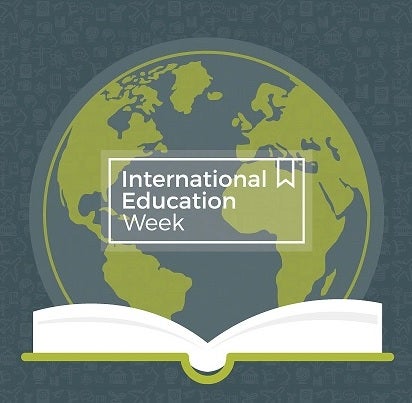
International Education Week is an opportunity to celebrate the benefits of international education and exchange worldwide. This joint initiative of the U.S. Department of State and the U.S. Department of Education is part of our efforts to promote programs that prepare Americans for a global environment and attract future leaders from abroad to study, learn, and exchange experiences in the United States. -http://iew.state.gov/-
To celebrate International Education, OISS is creating a list of International Recommended Reading. We prefer to include books that: 1) have been translated to English, and 2) somehow represent what is special and amazing about the culture they are from. Please note that each submission will be reviewed by a committee to ensure Rice standards are upheld. To submit a book to be included, please visit http://bit.ly/IEWreading. For more information about International Education Week at Rice, please visit oiss.rice.edu/iew.
We have books from the following countries (listed alphabetically by country below):
Bangladesh; Belarus; Brazil; China; Colombia; Finland; France; Germany; India; Indonesia; Japan; Mexico; Nigeria; Pakistan; Palestine; Paraguay; Singapore; Spain; Turkey; Ukraine; USA
BANGLADESH
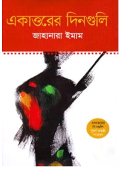
Jahanara Imam: Days of 71 (Original Title: একাত্তরের দিনগুলি - Ekattorer Dingulee)
Year of publication: 1986
Genre: Autobiography
Country of Origin: Bangladesh; Language originally published in: Bangla
Brief description: Ekattorer Dingulee is an autobiography by martyr-mother Jahanara Imam based on her experiences of the liberation war of Bangladesh in 1971. Jahanara Imam's son Shafi Imam Rumi, a student, fought the Pakistani army in Dhaka and urban regions.
How does this book represent Bangladesh? Publication of this book was a seminal event in the history of Bangladesh. It proved to be a catalyst for the renewal of faith in the destiny of Bangladesh as an independent nation.
Where can this book be found? Unfortunately this book doesn't seem to be available in the local libraries, but can be purchased on Amazon.
Submitted by: Warda Binte Humayun
BELARUS
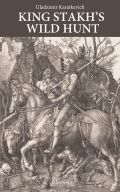
Uladzimir Karatkievich: King Stakh's Wild Hunt (Original Title: Дзікае паляванне караля Стаха)
Year of publication: 1964
Genre: Fantasy
Country of Origin: Belarus; Language originally published in: Belarusian
Brief description: Eerie and beautiful tale inspired by the Eastern European folklore. A young man, Andrej Biełarecki, stumbles upon a haunted castle surrounded by the marshes. The owner of the castle, the heiress of an old aristocratic family Nadzeja Janovska, is cursed. She talks about the ghosts, and she foresees her imminent death. Determined to unravel the secrets shrouding the castle, Biełarecki chooses to stay.
How does this book represent Belarus? One the key themes of the book is a poignant and distinctive history of Belarusian people. It is filled with sadness and resilience.
Where can this book be found? Unfortunately this book doesn't seem to be available in the local libraries, but can be purchased on Amazon.
Submitted by: Diana Dutava
BRAZIL
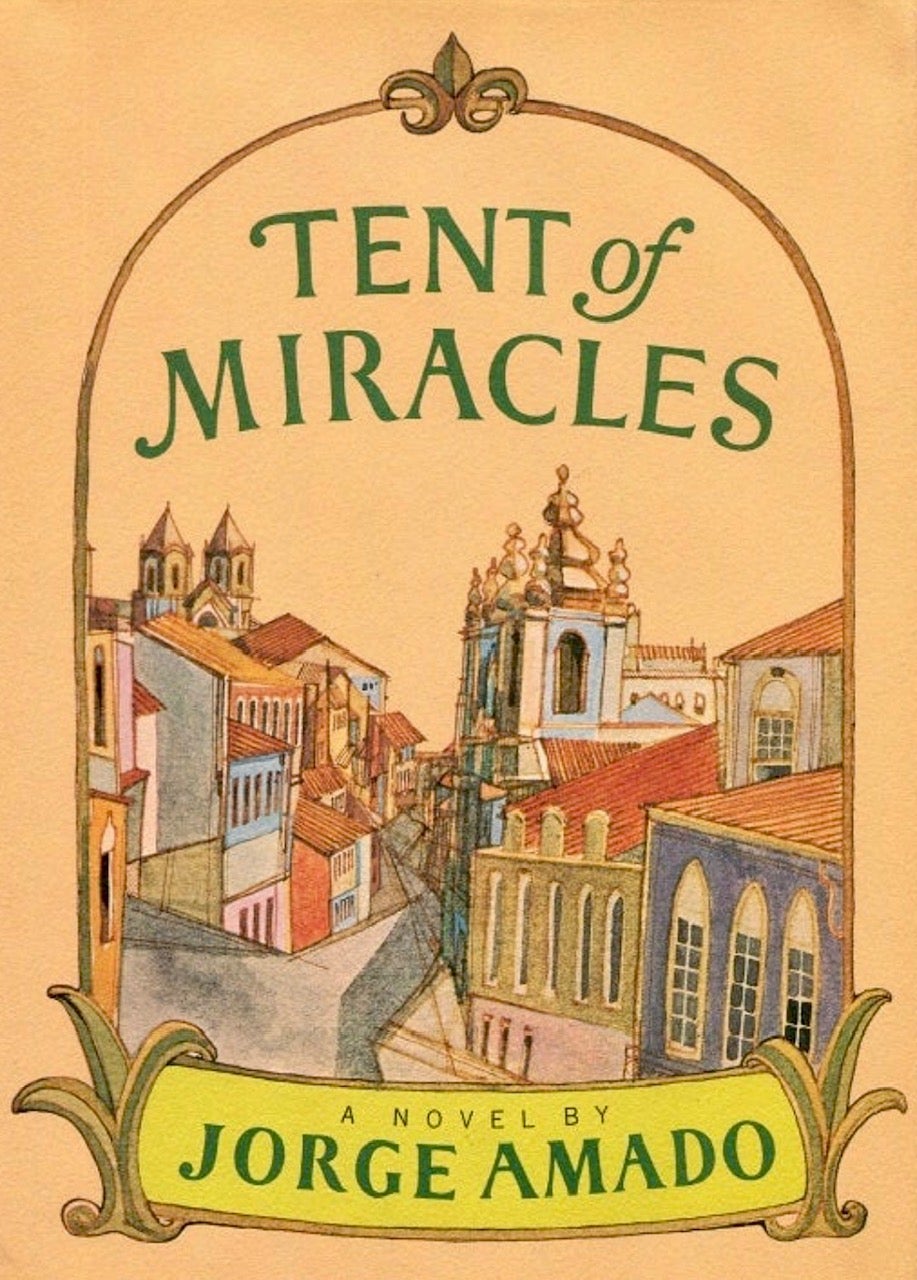
Jorge Amado: Tent of Miracles (Original Title: Tenda dos Milagres)
Year of publication: 1969
Genre: Fiction
Country of Origin: Brazil; Language originally published in: Portuguese
Brief description: We are introduced to Pedro Archanjo and his world in Bahia, Brazil, where race and religion play a big part. The book takes you to those streets, and you can almost hear the capoeira sounds or smell the food. Amazing book, one of my favorites.
How does this book represent Brazil? This Book gives a glimpse of the rich culture of the State of Bahia, Brazil. We can call the author Jorge Amado the ambassador of Bahia. His many (AMAZING) books introduced us to one of the most beloved characters in Brazilian literature. His Tent of Miracles Pedro Archanjo is a joy to behold.
Where can this book be found? Fondren Library. It can also be purchased on Amazon and in most bookstores.
Submitted by: Fabiana Santos

Paulo Coelho: Hippie (Original Title: Hippie)
Year of publication: 2018
Genre: Fiction
Country of Origin: Brazil; Language originally published in: Portuguese
Brief description: After hitchhiking from Brazil to nearly halfway around the world, Paulo stumbles across Karla, a young Dutch woman and like-minded soul, in Amsterdam’s famous Dam Square. Together they decide to take the fabled hippie trail across Europe to Nepal, aboard the Magic Bus, in search of self-discovery. So begins a life-defining love story that will set the course for the rest of their lives. Drawing on the rich experience of his own life, Paulo Coelho relives the dreams of a generation that longed for peace and challenged the established social order.
How does this book represent Brazil? Paulo Coelho relives the dreams of a generation that longed for peace and challenged the established social order.
Where can this book be found? Unfortunately this book doesn't seem to be available in the local libraries, but can be purchased on Amazon.
Submitted by: Vanessa Uribe
CHINA
Xun Lu (鲁迅): Diary of a Madman (Original Title: 狂人日记)
Year of publication: 1918
Genre: Novel
Country of Origin: China; Language originally published in: Chinese
Brief description: The novel reveals the "man-eating" nature of feudal rites through the portrayal of the persecuted "madman" and the madman's first-person narration. It expresses the author's resistance to the Chinese feudal culture, which is rooted in feudal rites, and also reflects the author's deep sense of remorse. From the standpoint of thorough "revolutionary democracy," the author conducts a profound reflection on Chinese culture, while also expressing deep and broad anger over the future of China and even humanity. The novel ends with the deafening cry of "Save the children," indicating that the author places hope in the future, entrusting it to the children.
How does this book represent China? "A Madman's Diary" is a classic masterpiece of Chinese literature. It is the first vernacular Chinese novel in the history of modern Chinese literature. Its publication marked the maturity of vernacular literature and its entry onto the historical stage. "A Madman's Diary" is a work with strong critical realism, directly pointing to the core of Chinese feudal culture while also mercilessly exposing the darkness of contemporary society. Through the portrayal of the madman, the author sharply reveals the "man-eating" nature of the family system and feudal rites, highlighting the author's resistance to the Chinese feudal culture rooted in family hierarchy and Confucian ethics. It also reflects the author's deep sense of remorse. From a thoroughly "revolutionary democratic" standpoint, the author offers a profound reflection on Chinese culture, expressing deep and wide-ranging anger about the future of both China and humanity.
Where can this book be found? Fondren Library.
Submitted by: Yunjie Xie
COLOMBIA
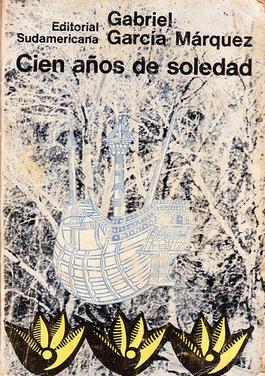
Gabriel García Márquez: One Hundred Years of Solitude (Original Title: Cien años de soledad)
Year of publication: 1967
Genre: Magic realism
Country of Origin: Colombia; Language originally published in: Spanish
Brief description: One Hundred Years of Solitude (Spanish: Cien años de soledad) is a landmark 1967 novel by Colombian author Gabriel García Márquez that tells the multi-generational story of the Buendía family, whose patriarch, José Arcadio Buendía, founded the town of Macondo, a fictitious town in the country of Colombia. The magical realist style and thematic substance of One Hundred Years of Solitude established it as an important representative novel of the literary Latin American Boom of the 1960s and 1970s, which was stylistically influenced by Modernism (European and North American) and the Cuban Vanguardia (Avant-Garde) literary movement.
How does this book represent Colombia? As a metaphoric, critical interpretation of Colombian history, from foundation to contemporary nation, One Hundred Years of Solitude presents different national myths through the story of the Buendía family, whose spirit of adventure places them amidst the important actions of Colombian historical events, such as the Liberal political reformation of a colonial way of life, and the 19th-century arguments for and against it; the arrival of the railway to a mountainous country; the Thousand Days' War (Guerra de los Mil Días, 1899–1902); the corporate hegemony of the United Fruit Company ("American Fruit Company" in the story); the cinema; the automobile; and the military massacre of striking workers as government–labour relations policy.
Where can this book be found? Fondren Library and Houston Public Library.
Submitted by: Silvia Fernandez-Diaz
FINLAND
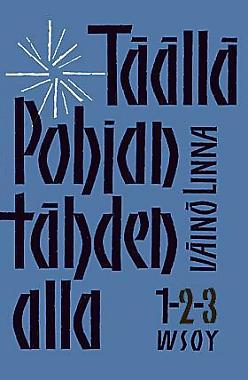
Väinö Linna: Under the North Star (Original Title: Täällä Pohjantähden alla)
Year of publication: 1959, 1960, 1962
Genre: Historical fiction
Country of Origin: Finland; Language originally published in: Finnish
Brief description: Under the North Star is a trilogy of books that tell the story of the Koskela family from 1880 to 1950. Through the perspective of an ordinary family with their own ups and downs, love stories, and other events, the books address some of the most intense periods of Finland's history, including the First World War, the Finnish Civil War and the Second World War.
How does this book represent Finland? Although Under the North Star is a work of fiction, it is considered to be a very realistic depiction of history. Through the trilogy of books the reader will get an idea of the lives and mentality of ordinary Finnish people, as well as learn about the effects the World Wars and the Finnish Civil War had on the country. This trilogy of books is considered to be one of the quintessential works in Finnish literature.
Where can this book be found? Unfortunately these books don't seem to be available in the local libraries, but can be purchased on Amazon or Barnes & Noble.
Submitted by: Andy Meretoja
FRANCE

Muriel Barbery: The Elegance of the Hedgehog (Original Title: L'Élégance du hérisson)
Year of publication: 2006
Genre: Novel
Country of Origin: France
Language originally published in: French
Brief description: From Wikipedia: "The book follows events in the life of a concierge, Renée Michel, whose deliberately concealed intelligence is uncovered by an unstable but intellectually precocious girl named Paloma Josse. Paloma is the daughter of an upper-class family living in the upscale Parisian apartment building where Renée works. Featuring a number of erudite characters, The Elegance of the Hedgehog is full of allusions to literary works, music, films, and paintings. It incorporates themes relating to philosophy, class consciousness, and personal conflict. The events and ideas of the novel are presented through the thoughts and reactions, interleaved throughout the novel, of two narrators, Renée and Paloma. The changes of narrator are marked by switches of typeface. In the case of Paloma, the narration takes the form of her written journal entries and other philosophical reflections; Renée's story is also told in the first person but more novelistically and in the present tense. First released in August 2006 by Gallimard, the novel became a publishing success in France the following year, selling over two million copies. It has been translated into more than forty languages, and published in numerous countries outside France, including the United Kingdom (Gallic Books, London) and the United States (Europa Editions, New York), and has attracted critical praise."
How does this book represent France? This novel transports you to Paris, the characters, the story, the humor everything represents a part of France.
Where can this book be found? Fondren Library and Houston Public Library. It can also be purchased on Amazon and in most bookstores.
Submitted by: Maria Corcuera
Simone de Beauvoir: All Men Are Mortal (Original Title: Tous les hommes sont mortels)
Year of publication: 1946
Genre: Novel
Country of Origin: France
Language originally published in: French
Brief description: A novel depicting the struggles of being a woman during the 50ies in a post-WWII Europe era, coupled with the philosophical question of what it would mean to live forever. A young woman develops a romantic interest for a man that, little did she know, is immortal. At this point, the book travels far back in time to 1279, to the years of Counts and Countesses, to the time of Italian City-States. Fosca, the immortal, is born and becomes an influential Prince. In his vanity and yearn for a clean city, he orders to throw out anyone who isn't pleasing to watch (namely the sick, homeless, lawless). Little did he know, that one of these homeless humans has an offer he cannot refuse. This homeless man is brought in front of Fosca, begging for mercy in exchange for an elixir that will make Fosca immortal. With little thought of what this would mean, Fosca agrees, drinks the elixir and becomes immortal. The rest of the book is a great narrative depicting how valuable things are for us humans, precisely because we know there is an end. What would happen to our feelings, our thoughts, if it didn't matter how many times or when we felt them because we have an endless amount of time? Great for someone looking for a mental and linguistic challenge.
How does this book represent France? This helps understand the struggles of French women in a post WWII scenario. It also speaks to the French romantic culture and dramatism.
Where can this book be found? Fondren Library.
Submitted by: Theresa Hoesl
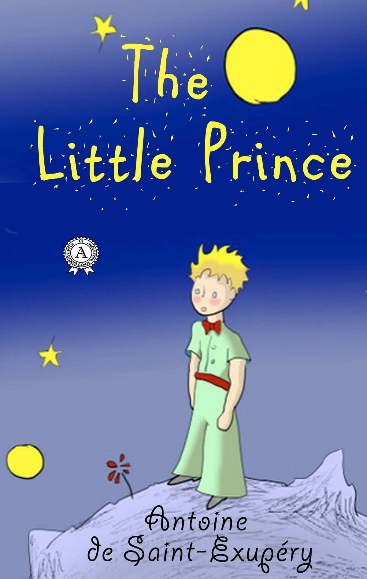
Antoine de Saint-Exupéry: The Little Prince (Original Title: Le Petit Prince)
Year of publication: 1943
Genre: Speculative fiction
Country of Origin: France (Though first published in the U.S. as the author’s works were banned by the Vichy Regime in France at that time.)
Language originally published in: English and French
Brief description: Created by French aristocrat, writer, and aviator Antoine de Saint-Exupéry, the Little Prince sees the world through the eyes of a child, but reasons as if he were a much-wiser adult. His story takes us on a voyage from his home on the tiny asteroid B-612 across space to several planets – eventually arriving at Earth. Along the way, the Prince experiences loneliness, friendship, love and loss. Through his personal secret, we learn that “It is very simple: It is only with the heart that one can see rightly; what is essential is invisible to the eye.” He makes us remember that “the eyes are blind. One must look with the heart.” The primary subject of this philosophical novel is the inner nature of every human being.
How does this book represent France? The Little Prince makes many observations about life and human nature that can be found not only in France, but in every continent and country on Earth (or any other planet).
Where can this book be found? Fondren Library and Houston Public Library. It can also be purchased on Amazon and in most bookstores.
Submitted by: Elmira Ganiyeva
GERMANY
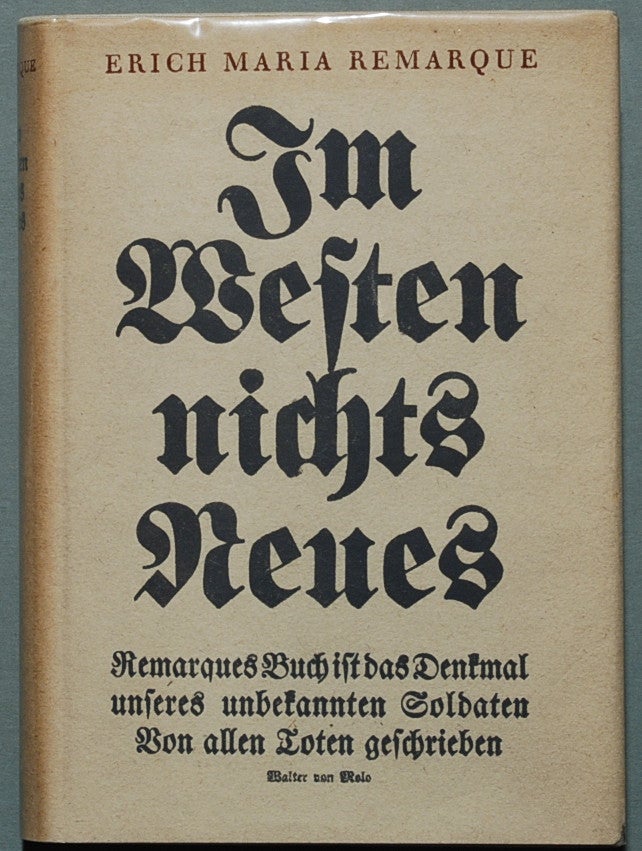
Erich Maria Remarque: All Quiet on the Western Front (Original Title: Im Westen nichts Neues)
Year of publication: 1928
Genre: War novel
Country of Origin: Germany; Language originally published in: German
Brief description: All Quiet on the Western Front is a novel written by Erich Maria Remarque, published in 1928. The story is narrated by Paul Bäumer, a young German soldier during World War I. The novel provides a powerful and realistic portrayal of the physical and psychological toll of war on soldiers. It explores themes of disillusionment, loss, and the dehumanizing effects of conflict as Paul and his comrades grapple with the harsh realities of trench warfare, ultimately questioning the senselessness of war and its impact on the human spirit.
How does this book represent Germany? More than 75 years after the end of the Second World War, the majority of the German population is not to blame for the crimes committed by the National Socialists during the Second World War. However, the responsibility to ensure that such horrors are never repeated is deeply rooted in the German soul. All Quiet on the Western Front was enormously popular even before the rise of the National Socialist dictatorship. However, the lessons of the book were quickly forgotten and a new war was started in the heart of Europe. The task now is to prevent this forgetting, to teach the horror of war to the individual, and thus to assume Germany's historical responsibility. That is why I am submitting this book to the Recommended Reading list. I am not alone in this opinion - a group of talented German filmmakers turned the book into a film in 2022 and were honored with four Academy Awards, including Best International Film. However, I like the book a little better as it focuses more on the individual. The movie shines with its impressive images.
Where can this book be found? Fondren Library and Houston Public Library. It can also be purchased on Amazon and in most bookstores.
Submitted by: Max Brückner
INDIA
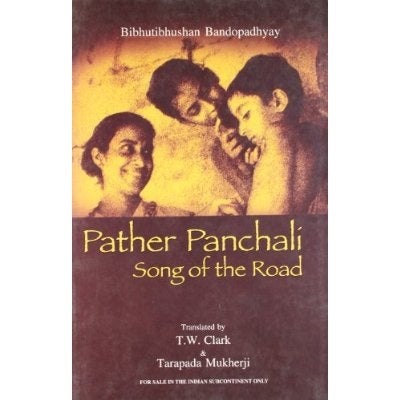
Bibhutibhushan Bandopadhyay: Song of the Road (Original Title: Pather Panchali)
Year of publication: 1929
Genre: Drama, Tragedy
Country of Origin: India; Language originally published in: Bengali
Brief description: The book follows Apu's journey, from his childhood to his adolescence, from a rural village of Bengal to Varanasi, the holy city of North India. This book is followed up by another book called Aparajito. These two books were adapted into a trilogy by eminent film director Satyajit Ray (The Apu trilogy).
How does this book represent India? This book represents Bengal and India, in its purest sense. But any reader from any part of the world can still connect with Apu and relate with all the characters. In that sense, this book is universal in its appeal.
Where can this book be found? Unfortunately this book doesn't seem to be available in the local libraries, but can be purchased on Amazon.
Submitted by: Rishab Dutta
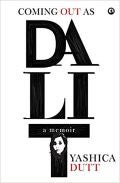
Yashica Dutt: Coming out as Dalit (Original Title: Coming out as Dalit)
Year of publication: 2019
Genre: Personal memoir, political non-fiction
Country of Origin: India; Language originally published in: English
Brief description: A personal memoir where the author describes how the caste system (that many used to hail as the unique feature of Indian culture) forced her to fake her identity and live her life as an upper caste, so as to not get discriminated. Aptly titled " 'Coming out' as Dalit", it shows you a side of India that is uncomfortable, real and gut-wrenching at times. Dalit student Rohith Vemula’s tragic suicide in January 2016, for Yashica Dutt, a journalist living in New York, this was the moment to stop living a lie, and admit to something that she had hidden from friends and colleagues for over a decade—that she was Dalit. In Coming Out as Dalit, Dutt recounts the exhausting burden of living with the secret and how she was terrified of being found out. As she began to understand the inequities of the caste system, she also had to deal with the crushing guilt of denying her history and the struggles of her grandparents and the many Dalit reformers who fought for equal rights. She writes about the journey of coming to terms with her identity and takes us through the history of the Dalit movement; the consequences of her community’s lack of access to education and culture; the need for reservation (affirmative action); the paucity of Dalit voices in mainstream media; Dalit women’s movements and their ongoing contributions; and attempts to answer crucial questions about caste and privilege. Woven from personal narratives from her own life as well as that of other Dalits, this book forces us to confront the injustices of caste and also serves as a call to action.
How does this book represent India? It forces one to see the aspects which are often overlooked, that are not comfortable and that doesn't really paint a pretty picture about India. It discusses the inhumane nature of the caste system prevailing India, through the lens of someone who has been a victim of the system.
Where can this book be found? Unfortunately this book doesn't seem to be available in the local libraries, but can be purchased on Amazon.
Submitted by: Anvy Kuriakose
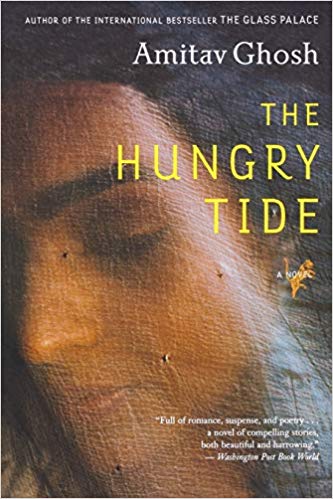
Amitav Ghosh: The Hungry Tide (Original Title: The Hungry Tide)
Year of publication: 2004
Genre: Psychological fiction
Country of Origin: India; Language originally published in: English
Brief description: The Hungry Tide is a very contemporary story of adventure and unlikely love, identity and history, set in one of the most fascinating regions on the earth. Off the easternmost coast of India, in the Bay of Bengal, lies the immense labyrinth of tiny islands known as the Sundarbans. For settlers here, life is extremely precarious. Attacks by deadly tigers are common. Unrest and eviction are constant threats. Without warning, at any time, tidal floods rise and surge over the land, leaving devastation in their wake. In this place of vengeful beauty, the lives of three people from different worlds collide. Piya Roy is a young marine biologist, of Indian descent but stubbornly American, in search of a rare, endangered river dolphin. Her journey begins with a disaster, when she is thrown from a boat into crocodile-infested waters. Rescue comes in the form of a young, illiterate fisherman, Fokir. Although they have no language between them, Piya and Fokir are powerfully drawn to each other, sharing an uncanny instinct for the ways of the sea. Piya engages Fokir to help with her research and finds a translator in Kanai Dutt, a businessman from Delhi whose idealistic aunt and uncle are longtime settlers in the Sundarbans. As the three of them launch into the elaborate backwaters, they are drawn unawares into the hidden undercurrents of this isolated world, where political turmoil exacts a personal toll that is every bit as powerful as the ravaging tide. The Hungry Tide is a prophetic novel of remarkable insight, beauty, and humanity.
How does this book represent India? This book opens up a window into the communities that have settled in the tiny islands at the extreme edge of the Ganges Bramhaputra delta. Their lives are controlled largely by the coming and going of tides, winds and natural disasters. Surviving in that harsh environment, constant human-wildlife conflict and poverty, as seen through the eyes of an outsider; and the connections she makes with the people living there make this a heart wrenching read.
Where can this book be found? Fondren Library. It can also be purchased on Amazon.
Submitted by: Debadrita Jana
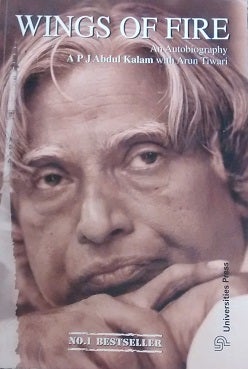
APJ Abdul Kalam & Arun Tiwari: Wings of Fire: An Autobiography of APJ Abdul Kalam
Year of publication: 1999
Genre: Non fiction
Country of Origin: India; Language originally published in: English
Brief description: This book traces the journey of the most beloved former Indian President - APJ Abdul Kalam, from a young boy who wakes up at 4am to sell newspapers in a remote village in southern India to a star scientist in the Indian Space Research Organization. The story highlights individuals and incidents that deeply influenced Dr. Kalam, and in the process, shows us that hard work and resilience have the ability to cut through any hardship. Above all, this is a story about dreams, and it leaves you with a innate drive to pursue your own dreams.
How does this book represent India? Religious traditions are deeply engrained in Indian society even today. This book presents examples of people who challenged those traditions, and in turn, taught the young Kalam the importance of being righteous over religious.
Where can this book be found? Unfortunately this book doesn't seem to be available in the local libraries, but can be purchased on Amazon.
Submitted by: Sapna Chhabra
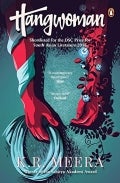
K. R. Meera: Hangwoman (Original Title: Aarachaar)
Year of publication: 2012
Genre: Novel
Country of Origin: India; Language originally published in: Malayalam
Brief description: Set in Bengal, it tells the story of a family of executioners with a long lineage, beginning in the fourth century BC. The protagonist of the novel, Chetna, is a strong and tenacious woman who struggles to inherit this profession. Aarachar is the story of twenty-two-year-old Chetna Grddha Mullick, the last link in a family whose members have been hangmen even before the birth of Christ. Her father, Phanibhushan Grddha Mullick is in his eighties and her brother is disabled as a result of an attack by the revengeful father of a man hanged by her father. This means that when the time comes, the burden of carrying the family tradition on will land squarely on the shoulders of Chetna, who will then become the country’s first official hangwoman. And that time, apparently, is now.
How does this book represent India? It describes in great detail the history of Mullicks and with it, the history of Bengal. It is one of the best "characterizations" of a city (Kolkota). It is also a very strong voice against patriarchy and shows how prevalent and influential it is still in India.
Where can this book be found? Unfortunately this book doesn't seem to be available in the local libraries, but both the original Malayalam version and the English translation can be purchased on Amazon.
Submitted by: Anvy Kuriakose
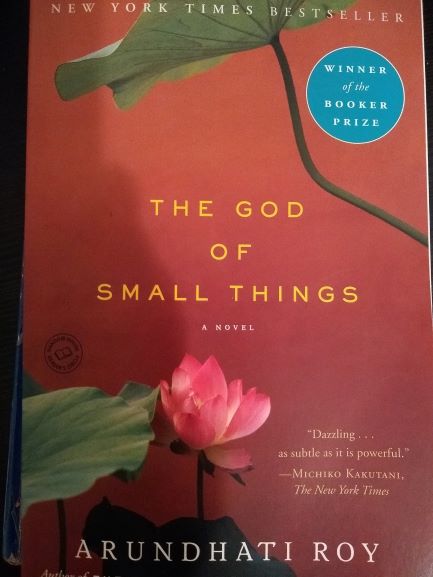
Arundhati Roy: The God of Small Things (Original Title: The God of Small Things)
Year of publication: 1997
Genre: Fiction
Country of Origin: India; Language originally published in: English
Brief description: This is a poignant story about innocence, separation and forbidden love - forbidden as per societal norms. In a time when the societal norms dictate who should be treated how, Ammu finds love in a forbidden place. The society is unforgiving. She is punished. So are the other innocent lives. A compelling tale, brilliant narration and beautiful writing. This story is bound to leave a lasting impression on you.
How does this book represent India? Travel back in time to the mid 20th century India, and witness one of the worst aspects of Indian history - the caste system. This story beautifully highlights the time in history when Indians valued artificial societal constructs more than real human lives. Sadly, in some rural areas, this is still the reality.
Where can this book be found? Houston Public Library. It can also be purchased on Amazon.
Submitted by: Sapna Chhabra
David Rubin: The World of Premchand: Selected Short Stories (Original Title: The World of Premchand: Selected Short Stories)
Year of publication: 1969
Genre: Short Stories
Country of Origin: India; Language originally published in: Hindi
Brief description: Perhaps the greatest Indian Hindi-Urdu writer of all time, David Rubin describes him as an unsurpassed master and the first serious short story writer who lifted fiction from a quagmire of aimless romantic chronicles to a high level of realistic narrative.
How does this book represent India? Munshi Premchand's short stories are considered classic masterpieces that reflect contemporary social issues that are as relevant today as they were more than a century ago.
Where can this book be found? Fondren Library (off-campus storage). It can also be purchased on Amazon.
Submitted by: Tanushree Dutta
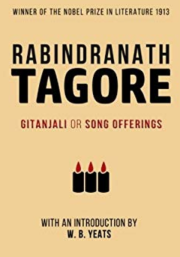
Rabindranath Tagore: Song Offerings (Original Title: Gitanjali)
Year of publication: 1912
Genre: Lyrical
Country of Origin: India; Language originally published in: Bengali
Brief description: This book is a collection of songs. The theme is spirituality and love. The songs are being offered to God, who is not a person to be feared but loved.
How does this book represent India? Rabindranath Tagore is one of the most important and celebrated authors of India. He is the author of the national anthems of both India and Bangladesh. Especially for bengalis, he is a cultural icon even after 70 years after his death.
Where can this book be found? Fondren Library and Houston Public Library. It can also be purchased on Amazon.
Submitted by: Rishab Dutta
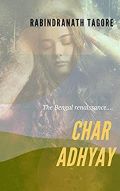
Rabindranath Tagore: Four Chapters (Original Title: Char Adhyay)
Year of publication: 1934
Genre: Drama
Country of Origin: India; Language originally published in: Bengali
Brief description: The book is set in the late Bengali Renaissance of the 1930s and 1940s, and a group of young intellectuals and revolutionaries involved with the Indian independence movement. It deals with the impact of political issues on personal lives and questions blind nationalism and blind adherence to a leader and delves into the ugly face of idealism.
How does this book represent India? It is set in the backdrop of Indian freedom movement and debates the nature of the two courses taken during the movement: that of non-violence as shown by Gandhi and the path of violent movement.
Where can this book be found? Unfortunately this book doesn't seem to be available in the local libraries, but can be purchased on Amazon.
Submitted by: Sohini Bhattacharyya
INDONESIA
Pramoedya Ananta Toer: This Earth of Mankind (Original Title: Bumi Manusia)
Year of publication: 1980
Genre: Historical fiction
Country of Origin: Indonesia; Language originally published in: Indonesian
Brief description: The central character and the narrator of This Earth of Mankind is a Javanese boy, Minke, who is fortunate to attend an elite Dutch school because he is a descendant of Javanese royalty (the character is based on Tirto Adhi Soerjo). Minke faces a complex and dangerous world when he meets Nyai Ontosoroh, a njai or concubine of a Dutch man. Minke's life becomes more dangerous when he falls in love with Annelies, the beautiful Indo daughter of Nyai Ontosoroh. In This Earth of Mankind, Pramoedya portrayed the unjust life of the Indonesian people during the Dutch colonization period when social status was governed by the amount of European blood running through their veins. Pramoedya characterized Minke as an outspoken person, who refuses this hierarchical society by becoming a writer instead of a speech-maker, which bears a resemblance to Pramoedya's life who was jailed for two years after carrying anti-Dutch documents and then became a writer.
How does this book represent Indonesia? This Earth of Mankind powerfully portrays the reality of Dutch colonial government in Indonesia through the lives of the characters, where Minke's education and Nyai Ontosoro's success in business count for little when ranged against the unyielding Dutch colonial law.
Where can this book be found? Fondren Library. It can also be purchased on Amazon.
Submitted by: Anusha Sankaranarayanan
JAPAN
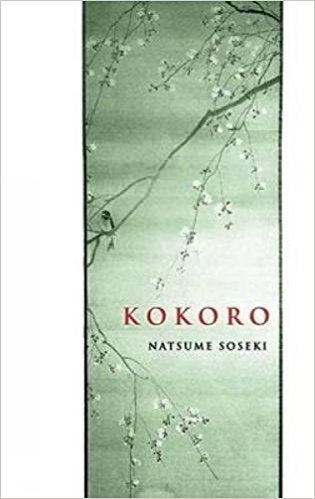
Natsume Soseki: Kokoro (Original Title: Kokoro)
Year of publication: 1914
Genre: Fiction
Country of Origin: Japan; Language originally published in: Japanese
Brief description: Kokoro is a classic Japanese novel by Soseki Natsume and read widely by Japanese people as it is also carried on Japanese High School text books. Kokoro, a term sometimes rendered as "the heart of things," deal with the transition from the Japanese Meiji society to the modern era, by recounting the friendship between a young man and an older man he calls "Sensei" (or teacher). The Sensei introduces the student to the moral dilemmas of life by using his own story as the example. He feels morally responsible for the suicide of a friend and, in the end, he takes his own. The author Soseki Natsume (1867~1916) is one of the greatest writer in modern Japan, and most analyzed Japanese author, by a considerable margin, in modern literature.
How does this book represent Japan? The story depicts the theme of isolation in the context of egoism and guilt, as opposed to shame. Sensei's decision to take his own life is also influenced by the suicide of General (Count) Nogi Maresuke on the same day of the funeral of the Emperor Meiji, which is a real story and somewhat symbolic to this novel's themes. The novels helps to understand Japan’s struggles with modernization and Westernization in Meiji era and sense of alienation at the end of the period. It also presents important themes such as changing roles and ideals of women, inter-generational change in values, the role of family, the importance of the self versus the group, and identity.
Where can this book be found? Fondren Library and Houston Public Library. It can also be purchased on Amazon.
Submitted by: Aki Shimada
MEXICO
Ángeles Mastretta: Tear This Heart Out (Original Title: Arráncame la vida)
Year of publication: 1985
Genre: Historical Fiction, Romance novel
Country of Origin: Mexico; Language originally published in: Spanish
Brief description: The novel is set in Mexico's post-revolutionary landscape and focuses on the lives of Catalina, a young woman who falls involved with General Andrés Ascencio, a famous political figure. The story dives into themes of love, power relations, and political intrigue, providing a detailed representation of Mexico's social and political environment at the time.
How does this book represent Mexico? The novel is a complex reflection of Mexico and its culture. The novel, set in post-revolutionary Mexico, goes into the historical context, illustrating the country's political and social transformation. It explores traditional gender roles and the changing roles of women in Mexican society, providing insight into changing cultural standards. The story also addresses issues of Mexican identity, both personal and national, and provides insight into the time's complex political circumstances.
Where can this book be found? Fondren Library and Houston Public Library. It can also be purchased in most bookstores.
Submitted by: Wendolyn Carlos
NIGERIA
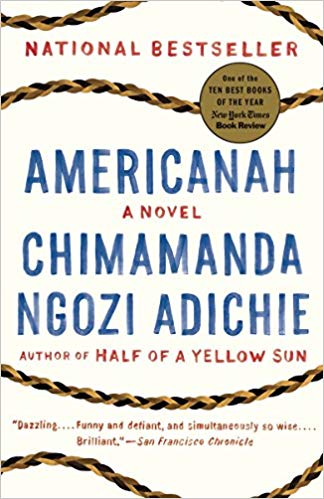
Chimamanda Ngozi Adichie: Americanah (Original Title: Americanah)
Year of publication: 2013
Genre: Fiction
Country of Origin: Nigeria; Language originally published in: English
Brief description: In Americanah, Adichie tells the coming-of-age stories of Ifemelu and Obinze, star-crossed lovers whose respective migrations (and return migrations) from Nigeria to the US and UK reveal the racist, sexist, and colonial convolutions of post-9/11 transnationalism.
How does this book represent Nigeria? Adichie explores the worlds of school, work, and interpersonal relationships in Nigeria, contrasting them throughout to those in the US & UK, especially through the lenses of race and gender.
Where can this book be found? Fondren Library and Houston Public Library. It can also be purchased in most bookstores.
Submitted by: Scott Pett
PAKISTAN
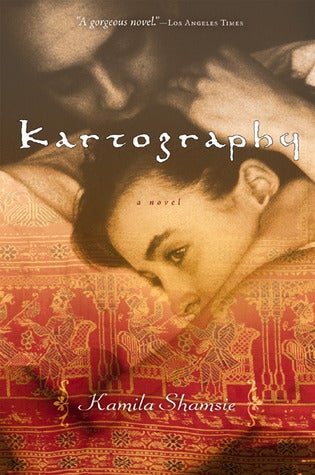
Kamila Shamsie: Kartography (Original Title: Kartography)
Year of publication: 2001
Genre: Fiction, History, Culture, Romance
Country of Origin: Pakistan; Language originally published in: English
Brief description: Raheen and her best friend, Karim, share an idyllic childhood in upper-class Karachi. Their parents were even once engaged to each others' partners until they rematched in what they call "the fiancée swap." But as adolescence distances the friends, Karim takes refuge in maps while Raheen searches for the secret behind her parents' exchange. What she uncovers reveals not just a family's but a country's turbulent history-and a grown-up Raheen and Karim are caught between strained friendship and fated love. A love story with a family mystery at its heart, Kartography is a dazzling novel by a young writer of astonishing maturity and exhilarating style. Shamsie transports us to a world we have not often seen in fiction-vibrant, dangerous, sensuous Pakistan. But even as she takes us far from the familiar, her story of passion and family secrets rings universally true.
How does this book represent Pakistan? The book not only incorporates many aspects of Pakistan's history, such as the 1971 civil war between East and West Pakistan, and the patterns of violence in Karachi during the 80s and 90s, but also talks about the resilience of Karachi in the face of many adversities. Geography becomes an important theme in the book, and Shamsie does a beautiful job of portraying Karachi's geography, both from an insider and an outsider's perspective.
Where can this book be found? Houston Public Library. It can also be purchased on Amazon.
Submitted by: Hafsa Ahsan
PALESTINE
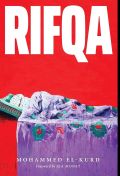
Mohammed El-Kurd: RIFQA (Original Title: RIFQA)
Year of publication: 2021
Genre: Poetry
Country of Origin: Palestine; Language originally published in: English
Brief description: Mohammed El-Kurd is an internationally-touring poet and writer from Jerusalem, Palestine. His work has been featured in The Guardian, This Week In Palestine, Al-Jazeera English, The Nation, and the forthcoming Vacuuming Away Fire anthology, among others. Mohammed graduated from the Savannah College of Art and Design with a B.F.A. in Writing, where he created Radical Blankets, an award-winning multimedia poetry magazine. He is currently pursuing an M.F.A. in Poetry from Brooklyn College. His poetry-oud album, Bellydancing On Wounds, was released in collaboration with Palestinian musical artist Clarissa Bitar. Apart from poetry and writing, el-Kurd is a visual artist, printmaker, and most recently, co-designer of a fashion collection with Serbian designer Tina Gancev. Mohammed has spent his undergraduate weekends performing poetry at campuses and cultural centers across the United States and hopes to continue in the post-COVID-19 era.
Where can this book be found? Fondren Library and Houston Public Library. It can also be purchased on Amazon.
Submitted by: Besma
PARAGUAY
Augusto Roa Bastos: I, the Supreme (Original Title: Yo el Supremo)
Year of publication: 1974
Genre: Historic Novel
Country of Origin: Paraguay; Language originally published in: Spanish
Brief description: Augusto Roa Bastos is best known for his complex novel Yo el Supremo (I, the Supreme) and for winning the Premio Miguel de Cervantes in 1989, Spanish literature's most prestigious prize. I, the Supreme imagines a dialogue between the nineteenth-century Paraguayan dictator known as Dr. Francia and Policarpo Patiño, his secretary and only companion. The opening pages present a sign that they had found nailed to the wall of a cathedral, purportedly written by Dr. Francia himself and ordering the execution of all of his servants upon his death. This sign is quickly revealed to be a forgery, which takes leader and secretary into a larger discussion about the nature of truth: “In the light of what Your Eminence says, even the truth appears to be a lie.” Their conversation broadens into an epic journey of the mind, stretching across the colonial history of their nation, filled with surrealist imagery, labyrinthine turns, and footnotes supplied by a mysterious “compiler.” A towering achievement from a foundational author of modern Latin American literature, I, the Supreme is a darkly comic, deeply moving meditation on power and its abuse—and on the role of language in making and unmaking whole worlds.
How does this book represent Paraguay? I, the Supreme talk about the historical events in Paraguay after its independence from Spain in 1811. The reading of I, the Supreme warns us about the complexity involved in the study of power in Latin American dictatorial figures within the social tissue and political life of its nations and how important language and communication is for a country. Main topics: History, psychology, language, myth.
Where can this book be found? Fondren Library.
Submitted by: Arturo Amarilla
SINGAPORE
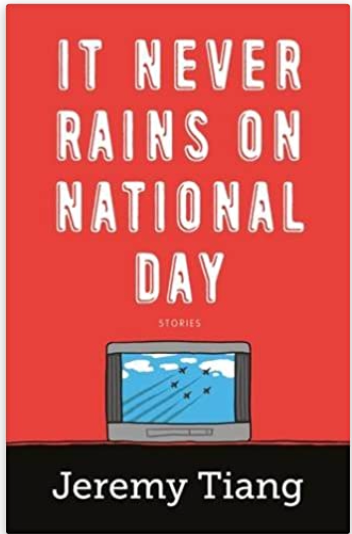
Jeremy Tiang: It Never Rains On National Day (Original Title: It Never Rains On National Day)
Year of publication: 2015
Genre: Short Stories
Country of Origin: Singapore; Language originally published in: English
Brief description: A woman fleeing her previous existence meets a fellow Singaporean on an overnight train in Norway. A foreign worker is decapitated in an HDB building site accident. A Singaporean wife must negotiate Beijing as her British husband awaits a heart transplant. And in different corners of the world, Singaporeans and exiles mark National Day in their own ways. Jeremy Tiang’s debut collection weaves together the lives of its characters across the world—from Switzerland, Norway, Germany, China, Canada, Thailand, New York City and back to Singapore. These wry, unsettling stories ask how we decide where we belong, and what happens to those who don’t.
How does this book represent Singapore? Explores the fragile identity of a young country of immigrants, and determines what aspects of the identity and the Singapore experience that we can truly call our own.
Where can this book be found? Unfortunately this book doesn't seem to be available in the local libraries, but can be purchased on Amazon.
Submitted by: Samantha Wibawa
SPAIN
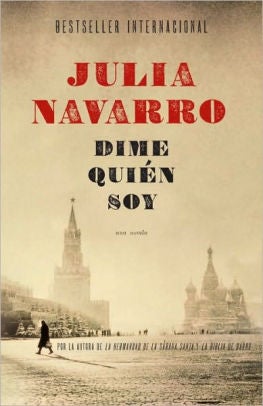
Julia Navarro: Tell Me Who I Am (Original Title: Dime quien soy)
Year of publication: 2010
Genre: Fiction
Country of Origin: Spain; Language originally published in: Spanish
Brief description: This is a novel about memory and identity with an exceptionally well-drawn and unforgettable literary character: a woman who throughout her extraordinary life was able to achieve the highly difficult feat of knowing herself. A victim of her mistakes, aware of her guilt, frightened by her traumas, she is above all an anti-heroine, a flesh-and-blood woman who always acts according to her principles, facing up to every challenge and making errors for which she will never fully pay. A woman who decided that she couldn't be neutral in this life.
How does this book represent Spain? Navarro's most personal novel surprises for its melodrama and the raw emotions transmitted by many of its stories. It is filled with pure adventure, introspection and political chronicle. From the tumultuous years of the Second Spanish Republic to the fall of the Berlin Wall, including World War II and the Cold War, these pages are packed with intrigue, emotion, politics, espionage, love, betrayal and settings like Madrid, Barcelona, Paris, Buenos Aires, Mexico, Moscow, London, Berlin and Warsaw with brief stopovers in The Basque Country, Cairo, Athens, Lisbon and New York.
Where can this book be found? Houston Public Library. It can also be purchased on Amazon.
Submitted by: Maria Corcuera
TURKEY
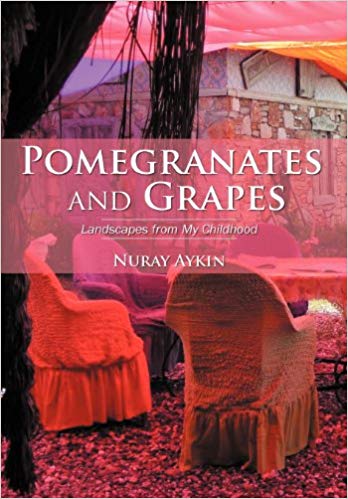
Nuray Aykin: Pomegranates and Grapes: Landscapes from My Childhood (Original Title: Pomegranates and Grapes)
Year of publication: 2012
Genre: Biography
Country of Origin: Turkey; Language originally published in: English
Brief description: When Nuray Aykın's only son left home for college, she wished to leave him a legacy that would provide insight into how he came to be. In this memoir, she narrates a colorful journey through Turkey and the United States as a mother, businesswoman, gardener, wife, ex-wife, daughter, sister, aunt, and stepmother. Pomegranates and Grapes tells stories of her loved ones and describes the places where she spent her childhood-from a little Mediterranean town to the city of Ankara, Turkey's capital. She recalls her homes in the United States: Buffalo, where cold weather and a new culture posed great challenges; Washington, DC, where their lives were deeply affected by loneliness and illnesses; and New Jersey, where she ultimately settled and found happiness. With wit, Aykın describes bitter moments with a sigh and happy moments with lyrical and delicious descriptions. A tribute to her family, Pomegranates and Grapes shares a memoir to be cherished.
How does this book represent Turkey? In the 130-page book Nuray explains the difficulty of raising his son in the USA while still believing and adhering to Turkish customs and traditions. She talks about her own hurdles in life and her book presents a great insight into Turkish family life.
Where can this book be found? Unfortunately this book doesn't seem to be available in the local libraries, but can be purchased on Amazon.
Submitted by: Burcu Tari
UKRAINE
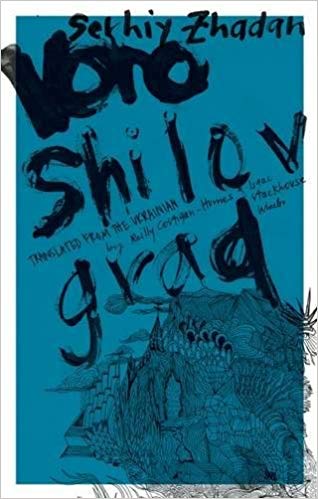
Serhiy Zhadan: Voroshilovgrad (Original Title: Ворошиловград)
Year of publication: 2010
Genre: Fiction
Country of Origin: Ukraine; Language originally published in: Ukrainian
Brief description: A city-dwelling executive heads home to take over his brother's gas station after his mysterious disappearance, but all he finds at home are mysteries and ghosts. The bleak industrial landscape of now-war-torn eastern Ukraine sets the stage for Voroshilovgrad, the Soviet era name of the Ukranian city of Luhansk, mixing magical realism and exhilarating road novel in poetic, powerful, and expressive prose. (World Literature Today's Recommended Summer Reads 2016)
How does this book represent Ukraine? The book describes psychological types of people living in the Eastern Ukraine, their environment and culture. Read it if you are wondering what people are in that part of the world.
Where can this book be found? Fondren Library. It can also be purchased on Amazon.
Submitted by: Pavlo Galich
USA
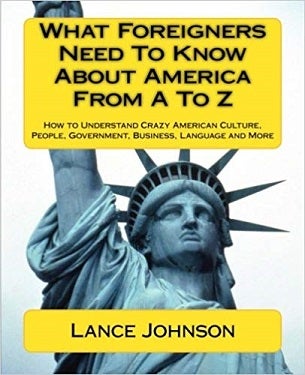
Lance Johnson: What Foreigners Need To Know About America From A To Z: How to Understand Crazy American Culture, People, Government, Business, Language and More
Year of publication: 2012
Genre: Reference work
Country of Origin: USA; Language originally published in: English
Brief description: In Lance Johnson’s own words: Used in foreign Fulbright student programs and endorsed worldwide by ambassadors, educators, and editors, it identifies how “foreigners” have become successful in the U.S., including students.
How does this book represent USA? In Lance Johnson’s own words: It explains how to cope with a confusing new culture and friendship process, and daunting classroom differences. It explains how U.S. businesses operate and how to get a job (which differs from most countries), a must for those who want to work with/for an American firm here or overseas. It also identifies the most common English grammar and speech problems foreigners have and tips for easily overcoming them, the number one stumbling block they say they have to succeeding here.
Where can this book be found? Fondren Library. It can also be purchased on Amazon, and it is available for browsing at OISS.
Submitted by: OISS
